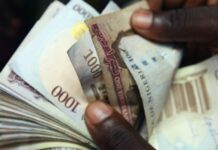The Federal Government exceeded its borrowing by N1.15tn for the period between January and August 2022.Punch reports.
A copy of the public presentation of the 2023 proposed budget by the Minister of Finance, Budget and National Planning, Mrs Zainab Ahmed, showed that the Federal Government planned to borrow N6.10tn in 2022.
A breakdown shows that the Federal Government planned to get N3.53tn from domestic creditors and N2.57tn from foreign creditors.
According to the document, the Federal Government estimated that it would borrow N4.07tn between January and August 2022.
However, the Federal Government accumulated N5.33tn debt within the period under review, which is N1.15tn higher than the expected N4.07tn planned debt.
A further breakdown showed that the Federal Government borrowed N4.82tn from domestic creditors and N510.21bn from foreign creditors.
The debt from domestic creditors includes the Federal Government’s borrowing from the Central Bank of Nigeria through the Ways and Means Advances.
Ways and Means’s Advances are loan facilities through which the CBN finances the shortfalls in the government’s budget.
Recall that the Federal Government borrowed a total of N4.61tn from the Central Bank of Nigeria through Ways and Means Advances between January and August 2022.
This means that majority of the Federal Government’s domestic debt came from its debt to the CBN.
The CBN says on its website that the Federal Government’s borrowing from it through the Ways and Means Advances could have adverse effects on the bank’s monetary policy to the detriment of domestic prices and exchange rates.
“The direct consequence of central banks’ financing of deficits are distortions or surges in monetary base leading to adverse effects on domestic prices and exchange rates i.e macroeconomic instability because of excess liquidity that has been injected into the economy,” it says.
The World Bank had, in November last year, warned the Nigerian government against financing deficits by borrowing from the CBN through the Ways and Means Advances, saying this put fiscal pressures on the country’s expenditures.
Despite warnings from experts and organizations, the Federal Government has kept borrowing from the CBN to fund budget deficits.
Also, the N22.07tn owed the apex bank by the Federal Government is not part of the country’s total public debt stock, which stood at N42.84tn as of June 2022, according to the Debt Management Office.
Recently, the country’s debt rose by N30.72tn between July 2015 and June 2022, according to data released by the DMO.
According to the DMO statistics, Nigeria’s total debt as of June 30, 2015, stood at N12.12tn. By June 30, 2022, the figure had risen to N42.84tn, which showed an increase of 253.47 per cent. Despite the high increase in debt over the years, the government still plans to borrow N8.4tn in 2023.
Experts have kicked against the Federal Government’s proclivity for debt, which they have described as unsustainable.
An Abuja-based policy think tank, Agora Policy, said Nigeria’s debt was unsustainable and put the country in a perilous situation due to the high cost of debt servicing.
The group advised the government to deepen and diversify sources of revenue, re-calibrate expenditure to spend smartly, and invest efficiently.
A former President of the National Accountants of Nigeria, Dr Sam Nzekwe, agreed that Nigeria’s debt was unsustainable.
He said, “The debt is huge. If you look at the budget, you will see that a huge sum of money is used to service debts. This is just the debt service charge. We are yet to talk about the principal.”
He also said that instead of focusing on the debt to GDP ratio, the focus should be on debt service to revenue ratio. He further noted that the country had a revenue problem.
A development economist, Dr Aliyu Ilias, criticized the government for its constant reliance on borrowing, which was not healthy for the economy.
He further urged the government to seek better ways of generating revenue rather than persistently borrowing.
However, the finance minister, when she appeared before the House of Representatives Committee on Finance last week, explained that the over-borrowing was a deliberate plan to ensure that money was released early for capital projects.
She said, “We are borrowing faster than what we had prorated. It was a conscious decision to make sure we have funds early enough to release for the implementation of capital projects.”
Meanwhile, the amount budgeted for recurrent expenditures has increased from N2.61tn spent in 2015 to N8.27tn in the proposed 2023 budget, according to data obtained from the Budget Office of the Federation.This shows an increase of N5.66tn or 216.86 per cent in six years, fuelling concerns over the rising cost of government overheads amid a declining revenue and weakening economy.
The PUNCH analysis revealed that recurrent expenditure recorded significant increases each year during the period under the review.
The former Nigerian President, Dr Goodluck Jonathan, approved a N4.49tn budget for 2015, which included a N2.61tn recurrent expenditure. Capital expenditure was N557bn, while money budgeted for debt service was N953.62bn. There was a fiscal deficit of N1.08tn.
The recurrent expenditure rose slightly by 1.53 per cent or N40bn to N2.65tn in 2016, out of a total expenditure of N6.06tn. Capital expenditure was N1.59tn, while money budgeted for debt service was N1.48tn. There was a fiscal deficit of N2.2tn.
In 2017, it rose to N2.99tn, representing an increase of N340bn or 12.83 per cent. Out of a total expenditure of N7.44tn, capital expenditure was N2.18tn, while money budgeted for debt service was N1.66tn. There was a fiscal deficit of N2.36tn.
In 2018, recurrent expenditure rose by N520bn or 17.39 per cent, raising the total recurrent expenditure to N3.51tn. Out of a total expenditure of N9.12tn, capital expenditure was N2.87tn, while money budgeted for debt service was N2.01tn. There was a fiscal deficit of N1.95tn.
The following year, the recurrent expenditure increased by N540bn or 15.38 per cent to N4.05tn. Out of a total expenditure of N8.91tn, capital expenditure was N2.09tn, while money budgeted for debt service was N2.25tn. There was a fiscal deficit of N1.95tn.
The recurrent expenditure was N4.84tn in 2020, out of a total expenditure of N10.59tn. This shows an increase of N790bn or 19.51 per cent. Capital expenditure was N2.47tn, while money budgeted for debt service was N2.7tn. There was a fiscal deficit of N2.28tn.











